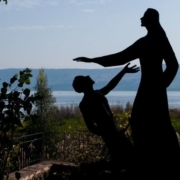Day 2: Space at the Table
BY JAMAL ADAMS | February 18, 2021
Today’s Readings

Today’s reading invites us to follow the teachings of the Lord, for he will lead us to the path of righteousness.
With the past year’s events seared into our memory, our faith is being challenged in ways that we could not have imagined. As we have wrestled with COVID-19, a historic racial reckoning, severe economic ramifications, and a tumultuous election season that included a siege on the Capitol, it has caused us to question not only the integrity of many of our American institutions, but also many of our relationships with friends, neighbors, and loved ones. We can’t escape the cry from every street corner and mountaintop that we center human dignity and provide equal opportunities for life, liberty, and the pursuit of happiness. Never has it been more evident that we must lean on one of our foundational Ignatian values, that of a faith that does justice.

Our national reality invites us to reach a new level of consciousness, commit to building new relationships, see with fresh eyes, and live our mission intentionally in the most prophetic way. Let’s cherish our many blessings that our communities afford us, including bringing together a diverse group of people with a multitude of backgrounds, lived experiences, home contexts, and disparate aspirations with the ultimate goal of being a beacon of light and hope for our world.
Bound together by this foundational value of the Jesuit mission and Ignatian charism, we have a precious opportunity to learn from each other, grow to love each other as we are, as we invest in understanding our unique stories and the richness of our cultures. We will seek to promote justice in a way that creates space at the table for everyone.
“No daylight to separate us. Only kinship. Inching ourselves closer to creating a community of kinship such that God might recognize it. Soon we imagine, with God, this circle of compassion. Then we imagine no one standing outside of that circle, moving ourselves closer to the margins so that the margins themselves will be erased.”
― Fr. Gregory Boyle, S.J., Tattoos on the Heart
For Reflection:
- In what ways can you respond to the call to create space at the table for everyone?
- How can you deepen your presence at the table by committing to building new relationships and learning from those around you, especially those whose lives do not mirror your own?
Jamal Adams is the principal at La Salle College Preparatory School in Pasadena, California. Prior to joining the Lasallian community, Adams served Loyola High School of Los Angeles as its director of equity and inclusion and director of faculty. As director of equity and inclusion, he instituted programs and projects that centered on deepening a culture of belonging on campus across affinity groups, with parents-guardians and other stakeholders from the community. He is the co-author of an essay “Teaching as a Practice Rooted in Black Brotherhood,” featured in an anthology entitled Teaching Black: The Craft of Teaching on Black Life and Literature (University of Pittsburgh Press, 2020). In addition to his publication, he is the co-host of a podcast, Just Conversations: Race, Faith, and Catholic Education, sponsored by the Ignatian Solidarity Network.









My challenge is to tolerate the intolerant. How do I agree to disagree with racial bigots, xenophobes, and misogynists?
This doesn’t address exactly the question you asked because I haven’t found that answer yet myself. But one of the things I have decided is that, while I might want to tolerate the intolerant, I do not have to show any signs of agreement or encourage them in any way. I have a little used bookshop, and am occasionally subjected to racist opinions and/or jokes from visitors. My response is an unsmiling face at the jokes and usually some type of comment such as, “We (my daughter and I own and run the shop) don’t talk like that here” or “We don’t feel that way.” We don’t argue or harangue, but we don’t accept either. And if we lose the business, so be it. And in all honesty, the type of person who would make those comments is usually not the type of person who is interested in buying books.
It is such a conflict to share a table with family members and friends who don’t agree with what is happening in the world and in our country, particularly as it relates to racism. This past year’s events has made me reflect on how I show in the world with respect to that and I’ve had to acknowledge that I may have behaved in racist ways, but now am learning how to be antiracist. I suppose we don’t all spend that time to self-reflect or don’t believe we may have acted in ways that would embarrass us. I suppose I can share my experience and pray that by sharing others may pause to reflect as well.
Kathleen, your post says exactly what I was thinking and describes what I am going through. I see the division the situation is causing in my own home and feel helpless to halt it. I feel I need some support but don’t know where to get it from.
I feel the same way Kathleen. What surprises me and is perhaps the most hurtful is that some family members have shown great disdain towards me to the point we can no longer see each other. This is very sad but I feel I need to move on and continue my work.
Though we live in a rather different context than yours, we in Quebec have been confronted by the same issues. Despite our public, free, state-financed health care system; despite our collective commitment to our own “brand” of democratic socialism (pitted by neoliberal capitalism), we saw a steep and troubling the number of old, poor and vulnerable people die from the pandemic.
We saw the same discourses as you guys heard asking to put the economy first, to let people die, to ‘forget’ about our collective commitment for human dignity and solidarity, as more and more people lost their jobs, their houses, their apartments, theur pride and their well being. A Skid Row like homeless camp arose in Montreal’s downtown, in the sub-zero cold of Canadian winter. Which was then raided by the police.
What does it say about us as a society, as a people, as Christians? Meanwhile, our government tries to cheer us up with broadcasting videos of our members of Parliament playing the piano or guitar in front of a fireplace, in a comfy, suburban house. While the homeless, the sick and the elderly are freezing and dying in despair… But when businessmen “cry” about their upcoming bankruptcies, suddenly our leaders can find some money – lots of it – without the slightest worry about our public debt.
I’m sick to my stomach when I see these things. Makes me think of the Gospel of Matthat. Mt 25, 40. What have we done to you, my Lord, by not protecting, loving, and caring about the little ones, the most fragile of our brothers and sisters.
Mt 6. How can we dare to stand before you as we act like Pharisee’s in our fake charity, photo-ops. But what about justice, real justice? But what about real brotherly love? What about a longer table, a broader and warmer blanket, like St. Martin of Tours’ cape?
O Lord hear our prayer. Change our hearts. So, we can walk toward your Kingdom.
Lent gives us the opportunity to look at life with an adjusted lens. We find ways to include all in whatever we are doing. We include others in our thoughts and create a space to include their thoughts in our space. We find ways to understand through our neighbor what the suffering of Christ in Lent means and how we can incorporate that into our daily actions. We share our own suffering with others and hope they can see the intentionality of our care for the community of believers we are part of. Through COVID we have suffered and continue to offer that suffering in union with Christ so we have a gift of suffering to offer to the Father.
This image of table has been coming up frequently for me in the past few days. In a discussion I had with a group on racism, the idea of the table came up and how we can have more diversity at the table. And someone mentioned however that our table is a pretty white table. And how welcoming is a white table? How do we make our table not about us who are whiteBut making it a table that starts with inclusivity. It’s like when people ask why don’t we have more blacks or people of color in our church? Is our church really respectful of the church of our black brothers and sisters? Perhaps instead of inviting brothers and sisters to our table we need to go to our black brothers and sisters table. Are we comfortable in doing that? If not, what stops us.
Glorious! Yes, come to the Black church table, and enjoy our rich fare!
As a League of Women Voters member, I have joined in collaboration with the NAACP and with people who have disabilities to protect and expand voting rights. My life has been enriched. I now work each day for social justice.
Continue to read in about reproductive justice, participating as a follower in local groups taking action in this area. Reach out to pro-life members to ask whether they are aware/interested in reproductive justice perspective.
Glad to be at the table. It can get lonesome if I see myself only. But I see the human and non-human world at my table. Some have inspiring things to say, including “share your little wealth.” Happy to!
Thank you for asking me to share reflections, prayers. Reflections- Seeing God in all things. Gratitude for seeing the image of God in the suffering and life of veterans. Graduated from Spring Hill Jesuit College, Mobile,AL; (MTS) seeing God in ALL ethnic communities. Veteran myself who attend a”Veteran Retreat “ at White House Jesuit Retreat House, St. Louis, MO- yearly. Then @Prayer”- St. Ignatian books, Sacred Space, Examin and daily prayer of the prayer for Servant of God, Father Vincent R. Capodanno, MM.
thank you.
Ann Marie Puck,
Retired special education teacher, catechist, and a Service- Welfare Officer
For years I would have said that our urban, Catholic Church was a welcoming, inclusive one where we invited everyone to join us. In reflection, I think there was a implicit message there to “come and be like us…fit in to our existing spaces…be here on our terms. The dominance of our white culture is hard to see when you’re white!
Praying for young folks to come to the table, esp Black and marginalized. Just watched PBS documentary, “The Black Church”-highly recommend. One pastor notes that many of the young people she speaks with believe in God, but not organized religion. I suspect that many of us have 1st hand experience of this. We, as Church, must respond quickly to current realities. My Lenten intention is to set a place at the table where I can, for Black and other marginalized youth.
I feel the call to keep reaching, with civility and compassion, to those I know who have been rejecting truth. I cannot lure them back but I can make certain that they feel welcome when they turn around.
The Open Door Community in Atlanta was my introduction to the table, Residents were formerly homeless and daily provided sandwiches, laundry, socks, underwear, hygiene products, restrooms, showers, internet, phone and a mail address. Volunteering there was humbling and fulfilling.
We started First Tuesday evenings of potluck supper, fellowship, and a Spanish communion service for Mexicans and Latin-Americans. Food fellowship is integral to Latino culture and a way to build relationships. A former missionary in our congregation was organizer and host we are both bilingual.
I read today’s liturgical readings…..the submitted essay seems about externals, more social than spiritual….
Thanks. Creating space at the table for the Lord in disguise.